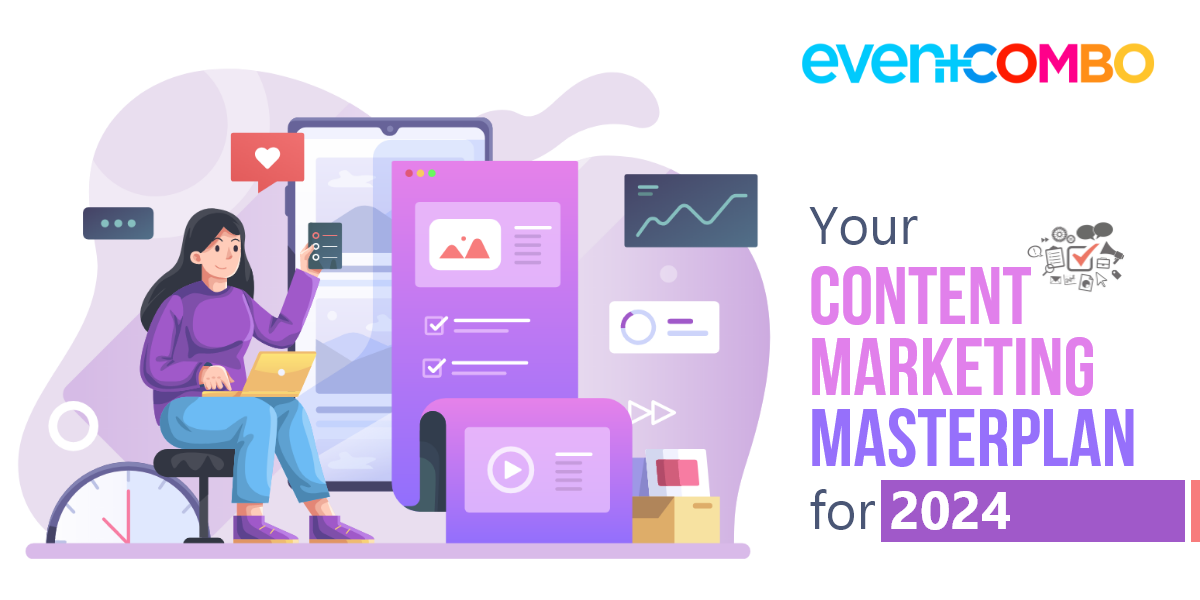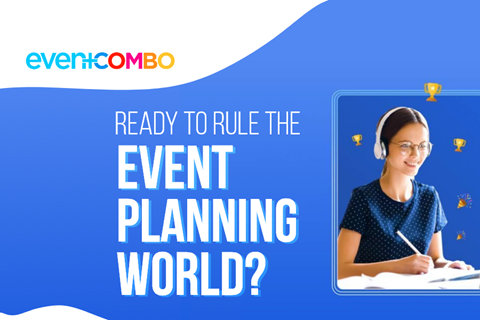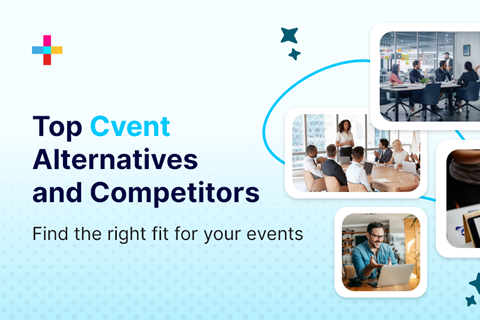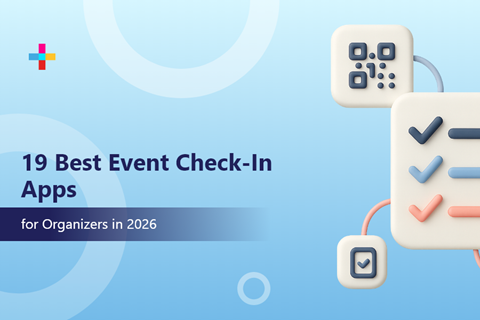

What does your dream event look like?
Probably an event that not only captivates your audience but also resonates with them long after it concludes. An event that becomes a topic of conversation, is trending on social media, and setting benchmarks in attendee engagement. However, transforming this vision into reality requires more than just meticulous planning and execution. It demands a strategic approach to content marketing that's both innovative and impactful.
This blog delves into the secrets of event content marketing and how to maximize the impact of your events through strategic content marketing.
Let’s dive in!
What Is Event Content Marketing?
Event Content Marketing refers to the strategic creation, distribution, and management of relevant and valuable content before, during, and after an event. This approach utilizes various forms of content, such as blogs, videos, social media posts, infographics, and more, to promote and elevate the event's theme, message, and goals.
Event content marketing plays a crucial role in event success because it
What Are the Different Types of Event Content?
Diversity is key in the realm of event content marketing. The right mix of content types can captivate your audience, communicate your message effectively, and leave a lasting impression. From visually striking graphics to thought-provoking written pieces, each type of content plays a unique role in the success of your event.
Let's delve into the various forms of content for your event marketing:
1. Visual Content
Visuals, including both images and infographics, are communication powerhouses. When used effectively, they can set the tone, evoke emotions, and create a visual narrative for your event. You can use visuals to effectively showcase your event schedules, speaker profiles, or key statistics, making them more accessible and relatable to your audience.
The significance of visual content is further amplified in the digital age. Social media platforms, which are predominantly visual, offer an expansive avenue for promoting events. Content with relevant visuals increases the viewer’s desire to engage by 80%. A compelling graphic or infographic related to your event can quickly go viral on social media, significantly expanding your event's reach and engagement.
2. Written Content
Written content offers depth and insight beyond what visuals can convey. This includes formats like blog posts, articles, email newsletters, and press releases.
Blog posts and articles are particularly effective for delving into the event's themes and topics. It provides a platform for thought leadership and enhancing SEO efforts. For instance, detailed posts about speakers or event highlights can pique the interest of the audience and help drive organic traffic to the event's website.
Email newsletters are another powerful tool that keeps potential attendees informed and engaged with updates and exclusive content related to the event.
3. Video Content
Video content encompasses everything from promotional teasers and live event streams to post-event highlight reels. It offers a dynamic way to showcase the energy and key messages of an event. According to a HubSpot study, 92% of video marketers report that video content provides them with a positive return on investment. This underlines the growing preference for video content to engage the audience.
The appeal of video content lies in its versatility and impact. For instance, promotional videos can create buzz and anticipation ahead of the event, while live streaming allows for real-time engagement.
Also, post-event videos, like highlights or speaker sessions, give a glimpse of what was missed to those who couldn't attend.
4. Interactive Content
Interactive content is a dynamic and engaging form of content marketing for events that has the ability to intrigue and sustain audience interest. Unlike traditional content formats, interactive content requires active engagement, keeping attendees invested and entertained.
This type of content can take various formats, such as polls, quizzes, surveys, live Q&A sessions, and gamified elements. These formats not only make events more enjoyable but also provide valuable insights into audience preferences and opinions. For instance, a live poll during a product launch event can help gauge immediate reactions and gather feedback that can inform future product development. In a similar way, webinars and virtual workshops enable real-time interaction, allowing attendees to ask questions, participate in discussions, and collaborate with presenters and fellow participants.
5. Case Studies
Case studies provide real-world examples of success, demonstrating the impact and effectiveness of your event.
For example, if your event successfully helped a company increase its revenue by 30% through implementing new strategies discussed at the event, a case study can outline this achievement in detail. It adds credibility to your event by illustrating how it has positively impacted participants and organizations.
Moreover, case studies can also act as persuasive marketing tools. When potential attendees or sponsors see concrete evidence of the value they can gain from your event, they are more likely to commit to the event.
Developing a Robust Event Content Marketing Strategy
Creating a powerful event content strategy is the foundation of successful content marketing for events. It's the roadmap that guides your efforts in engaging your audience, promoting your event, and achieving your goals. Let's explore how to build a strategy that sets your event up for success.
1. Analyzing Target Audience
Understanding your target audience is the starting point of any effective event content strategy. It involves diving deep into the demographics, preferences, and pain points of your potential attendees. Without this crucial information, your content may miss the mark.
One way to gather valuable audience insights is through surveys and data analysis. For example, if you're organizing a tech conference, surveys can help determine the topics that resonate most with your audience. Are they interested in AI, cybersecurity, or blockchain? Knowing this can shape your content strategy.
Additionally, social media analytics can provide insights into your audience's online behavior. Tools like Facebook Insights and Google Analytics can reveal audience demographics, interests, and online engagement patterns. This data can inform the type of content that will resonate most with your target audience.
For instance, let's say your analysis reveals that your audience is highly engaged with video content on social media. This insight can guide your content strategy to prioritize video teasers, interviews, or live streams to promote your event.
2. Setting Clear Objectives
Defining what you want to achieve with your event content is crucial. Is it to increase event registrations, boost attendee engagement, or secure more sponsors? The more specific and quantifiable your objectives are, the easier it is to track progress and evaluate success.
For example, if your objective is to increase event registrations, your content strategy might prioritize creating informative blog posts, compelling social media campaigns, and eye-catching visuals that drive potential attendees to register.
It's worth noting that data-driven decisions are at the heart of setting clear objectives. Analyze past event data to identify areas where your content strategy can make the most impact. For instance, if you find that a significant portion of registrations came from social media referrals in previous events, you may decide to allocate more resources to social media content for your upcoming event.
Furthermore, consider the SMART framework when setting objectives: Specific, Measurable, Achievable, Relevant, and Time-bound. This ensures that your objectives are not only clear but also realistic and tied to a specific timeline.
3. Content Creation and Curation
Effective event content strategy relies on a balance between creating original content and curating existing valuable content. This approach ensures that your audience receives fresh and relevant information while leveraging the expertise and insights of others in your industry.
Start with a content calendar that outlines what content needs to be created, when it needs to be published, and who is responsible for its creation. This helps maintain consistency and ensures that your content aligns with your event timeline.
Additionally, content curation involves sharing valuable content from other sources that complement your event's theme or objectives. This not only provides diversity in perspectives but also positions your event as a valuable resource hub.
Curated content can include industry reports, relevant articles, or insightful blog posts. Remember to give credit to the original creators when curating content and add your insights or commentary to provide context for your audience.
4. Optimize Your Content for SEO
Organic search drives 53% of all website traffic. Optimizing your event content for SEO can significantly increase the visibility of your event and attract more attendees.
Identify relevant keywords and phrases that potential attendees might use to search for events like yours. Tools like Google Keyword Planner or SEMrush can help you discover valuable keywords. After identifying keywords, create high-quality, informative, and engaging content that aligns with your event.
5. Measuring and Analyzing Content Performance
Measuring and analyzing the performance of your event content is a critical step in refining your content strategy and ensuring its effectiveness in achieving your event's goals. Without data-driven insights, it's challenging to identify what's working and what needs improvement.
Define key performance indicators (KPIs) that align with your event objectives. These KPIs can include metrics like:
For example, if your goal is to increase event registrations, track how many registrations are directly attributed to specific content pieces. If you find that a particular blog post or social media campaign consistently drives registrations, you can allocate more resources to similar content in the future.
Repurposing Content for Event Content Marketing
Repurposing content involves taking existing content assets and adapting them into different formats or for different platforms. It serves two primary purposes: extending the reach and maximizing content lifespan.
10 Innovative Ways to Repurpose Your Event Content
1. Transform Event Presentations into Informative Blog Posts
Blog posts are highly shareable and can attract a wider online audience. Repurposing event presentations into informative blog posts can breathe new life into your event content. You can select key presentations from your event, particularly those that are rich in insights and valuable information, to transform them into informative blog posts.
The Moz Blog frequently repurposes content from its annual MozCon event into blog posts. By doing so, they extend the reach of their event insights to a global audience interested in SEO and digital marketing.
2. Create Engaging Video Highlights from Event Recordings
More than nine out of 10 people want to see more video content from brands they support. Creating video highlights from event recordings allows you to showcase the most compelling moments of your event, making it more accessible and shareable.
What you can do is select key moments, sessions, or presentations from your event and edit them into shorter, highly shareable video clips.
TED Talks is a prime example of effective video content repurposing.
They edit full-length conference presentations into short, impactful talks that are widely shared on YouTube and other platforms, extending their reach far beyond the live event audience.
3. Craft Visually Appealing Infographics Summarizing Key Event Takeaways
Infographics are attention-grabbing and shareable on social media. Infographics provide a quick and visually engaging way for your audience to grasp the most important insights from your event.
You can identify the most significant insights, statistics, or trends discussed at your event and design infographics that present this information in an easy-to-digest visual format.
4. Repurpose Speaker Interviews into Podcast Episodes
Many events feature interviews with industry experts and thought leaders, which can be transformed into podcast content.
By converting speaker interviews into podcast episodes, you can provide an alternative format for your audience to consume event content, catering to those who enjoy on-the-go learning through podcasts.
5. Compile Attendee Testimonials into Compelling Case Studies
Case studies are powerful marketing tools. Compiling attendee testimonials into compelling case studies is a persuasive way to provide social proof and demonstrate the value of your event to potential attendees.
They can share their perspectives on the event, emphasizing the sense of community, the variety of sessions, and the impact of these experiences on their personal and professional growth.
6. Develop a Series of Social Media Posts from Event Content Snippets
Identify key takeaways, quotes, or visuals from your event presentations or sessions, and craft engaging social media posts around them. This allows you to share valuable insights and attract engagement from your online community. These posts can be scheduled strategically to maintain interest and anticipation for your upcoming events. A renowned tech and culture event, frequently repurposes event content into social media posts. They share memorable quotes, visuals, and highlights from their sessions, sparking discussions and interactions among their followers.
7. Turn Event Data and Insights into Informative Whitepaper
Whitepapers are authoritative documents that provide in-depth information and analysis. They are highly regarded by professionals and can serve as valuable resources for decision-making. You can gather data, research findings, and key insights presented during your event and compile them into comprehensive whitepapers.
8. Design Interactive Quizzes or Polls Based on Event Content
Interactive quizzes and polls encourage audience participation and engagement. Recent data shows that interactive content generates 52.6% higher engagement than static content. By designing interactive quizzes or polls based on event content, you not only engage your audience but also reinforce key takeaways and knowledge from your event. These quizzes test participants' knowledge of various concepts and trends discussed during the event, creating a fun and educational experience.
9. Transform Event Decks into Shareable SlideShare Presentations
SlideShare presentations are highly shareable and discoverable. They are often used for educational and informational content. Repurposing event decks into SlideShare presentations allows you to reach a broader online audience interested in your industry or topic.
TED Conferences frequently repurpose event decks into SlideShare presentations.
These presentations feature compelling visuals and concise content, making them informative for a global audience.
10. Create a Year-Round Content Calendar by Scheduling Content Updates and Reminders
Consistent content updates keep your audience engaged and informed. This approach keeps your event on top of mind for your audience and fosters ongoing engagement. You can plan a schedule for repurposing and sharing event-related content at strategic intervals.
Effective Content Distribution Strategies for Events
Effective content distribution is crucial for maximizing the impact of your event content. It ensures that your carefully crafted content reaches the right audience on the right platforms. Let's explore the key strategies for successful content distribution.
Essential Tools for Event Content Marketing
Efficient event content marketing relies on the use of appropriate tools and platforms to streamline content creation, distribution, and analysis. Let's explore the essential tools that can enhance your event content marketing efforts.
Crowdsourcing for Event Content
Crowdsourcing event content involves tapping into the collective creativity and expertise of your audience and industry peers to enhance your event's content strategy. It's a collaborative approach that can lead to fresh ideas, increased engagement, and a sense of community among event participants.
Here are some best practices for crowdsourcing event content:
Explore our latest blog post on innovative crowdsourcing approaches for event content. Discover actionable strategies and real-life examples of successful crowdsourcing in event content creation.
Elevate Your Event Content Marketing with Eventcombo! Content is your most potent tool in the world of event marketing. It's the bridge that connects your audience to your event, and when wielded effectively, it can transform your event's reach, engagement, and ROI.
From understanding the diverse types of event content to crafting a robust content strategy, embracing the power of repurposing, and leveraging the right tools and strategies, your event content marketing journey is a roadmap to success.
Remember, your audience is waiting for content that resonates, engages, and inspires action. By implementing the strategies and techniques outlined in this guide, you'll not only meet but exceed their expectations.
So, what are you waiting for? Elevate your event content marketing, and watch your events soar to new heights.
Learn more with our experts - https://bit.ly/3R9bkuP

Professional certifications for event planners do more than provide a solid foundation in the field; they offer valuable exposure to the dynamic world of event planning and insights from prominent industry experts.

Choosing the right event management platform is vital for event professionals navigating the growing demand for in person , virtual, and hybrid events. Modern planners need solutions that offer robust features,...

Attendees don't notice good check-in. They only notice bad check-in. And planners know check-in is the first moment where their behind-the-scenes work gets exposed.